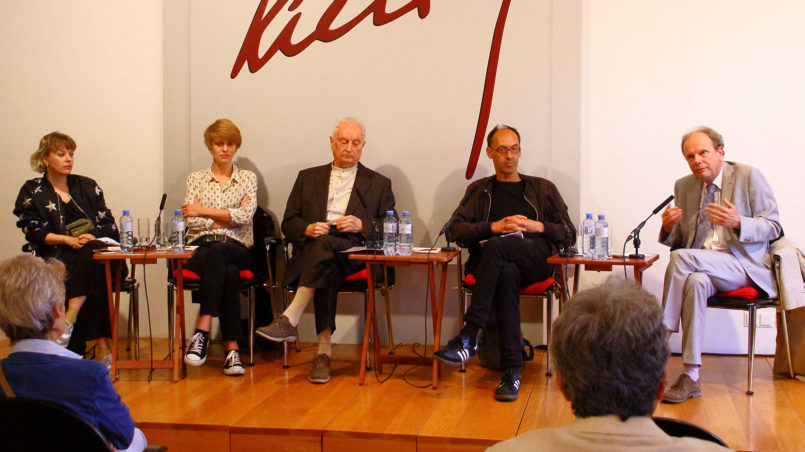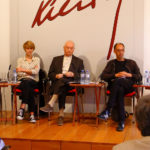1968 – the Impact to Date

Event data
- Datum
- 14. 5. 2018
- Host
- Bruno Kreisky Forum for international dialogue
- Location
- Bruno Kreisky Forum, Vienna, Austria
- Event-type
- Panel discussion
- Participants
- Robert Misik, author und journalist, presentation
- Raimund Löw, historian and journalist
- Erwin Lanc, formerly federal minister of internal affairs in cabinet of Bruno Kreisky
- Christine Schörkhuber, media artist, filmmaker, musician
- Natalie Assmann, artist, film director, activist
As part of the commemoration year “Das rote Jahrhundert” (“The red century”), a panel discussion entitled “1968 ff. – die Sozialdemokratie, neue soziale Bewegungen und gesellschaftliche Modernisierung” (1968 ff. – social democracy, new social movements, and social modernisation) was held at the Bruno Kreisky Forum in Vienna on 14 May 2018. The discussion focused on the question of what effects and significance have the protests from 1968 had until today?
The political and social upheavals of 1968 were a starting signal for new social movements which were taking place outside the parties for the first time. “Social democracy has benefited from the 1968 movement” – with this statement, the moderator, author, and journalist, Robert Misik, initiated the discussion.
What 1968 meant for Austria is “being discussed on a very parcelled basis,” explained historian and journalist, Raimund Löw. One forgets that this was a “global international movement”. The activists of that time kept an eye on events all over the world – the movement took place in various states, “in a parallelism that was phenomenal,” emphasised Löw, who stressed the worldwide sense of community among the activists. “This was an era in which the balance of power changed everywhere towards the left, towards civil society.” Today, the global balance of power is turning in the opposite direction, Löw stated:
Demagogic nationalists are on the offensive and are networking internationally. We have an ‘international’ of nationalists.
Today, for example, the right-wing organises far more international meetings than the Social Democrats. The left-wing, on the other hand, is on the defensive and is not able to give an answer – the only one currently offering a social democratic vision is French President, Emmanuel Macron.
Erwin Lanc, former Minister of the Interior of the Kreisky government and by far the oldest participant in the discussion at the age of 88, opened his statement with the amusing sentence: “As always, when young people revolt, the question of whether they are allowed to do so at all arises”. A controversial discussion process took place within the SPÖ, but also many negotiations with the young opposition members.
Kreisky always sought dialogue with the leaders of the youth movement. That was also the reason why there were never clashes in Austria like in France.
Lanc then referred to the developments in Czechoslovakia at that time, which hardly come up in discussions about the year 1968. He said that he was a sports coach at the time and in this function he also visited the CSSR several times, thus building a basis of trust with communist officials. “So we noticed that something was happening in the country.” The events in the CSSR were an essential part of the 1968 movement, Lanc said: “In 1968, it wasn’t just the rebellious youth in the democracies that started out.”
The artist, Christine Schörkhuber, more than fifty years younger than Lanc and thus with a completely different background, argued that 1968 is still interesting from an artistic point of view today. The Fluxus movement has been calling for the dissolution of hierarchies, and the eco-movement is still having an effect today, of course.
What is the relevant thing about movements? The politically immanent potential, because people must unite among themselves.
So the history of the organisation of social movements began in 1968, and this organisational knowledge has potential even if one ultimately does not reach one’s goal. “Yes, 68 was a success,” of this Schörkhuber was certain.
Natalie Assmann, also an artist, but at the same time politically active (for example, in the women’s petition for a referendum), referred in the connection between 1968 and art to Viennese actionism, which brought an opening of art and culture in connection with activism. “The artists of today build on the legacy of the actionists.” However, the political use of actionist art has changed: “Today, actionism is appropriated by the right.” In April 2016, for example, the “Identitären” unannouncedly rolled out a banner at the Burgtheater in Vienna – a form of protest that was formerly used in a very similar manner by the left. The international network is much stronger on the right than on the left – the artist Raimund Löw agreed. And further:
1968 has something nostalgic for us today. The feeling of collective is no longer really tangible for our generation.
On the subject of international networking, Lanc added that Austrian social democracy managed to pull together for a long time.
In my opinion, a party that wants to achieve its objectives must first formulate these objectives.
An essential difference between the SPÖ and the German SPD is that the split-off of the left-wing there as the “The Left” party has weakened the movement. It must be ensured that like-minded people outside the party can be included. “Discussion alone will not win the political war,” stated Lanc, “and we are in a political war.” The right is supported by three-quarters of the media. The instrumentalisation of new media for one’s own purposes could “certainly be a counter-movement”. But today it is no longer the producers who set the tone, according to Lanc, but the speculators:
Hedge funds determine the world much more than any excitement. However, nobody in social democracy is concerned with this, it is not debated at all.
Löw pointed out that 1968 is still a bogeyman for the right. “But what’s so terrible for them?” Right-wing ideology is based on national egoism, Löw answered his rhetorical question:
The demand to blow up borders is terrible for the right.
The destruction of unquestioned authorities such as the patriarchal family was also an essential point of the 1968 movement.
As expected (in view of the composition of the podium), the significance of the 1968 movement for the present time was assessed as consistently positive. What seemed particularly interesting was the evaluation from several sides that the political resources used by the 1968 movement are now being taken up by the right.
Translation German-English: Anna Dichen
Credits
| Image | Title | Author | License |
|---|---|---|---|
 |
00_VA_1968-Die Auswirkungen bis heute_Martin-Krake- | Martin Krake | CC BY-SA 4.0 |
